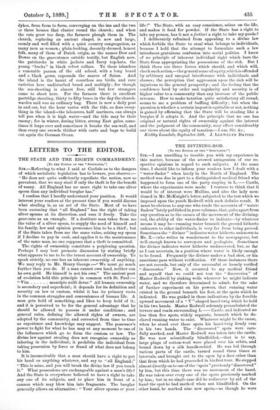LETTERS TO THE EDITOR.
THE STATE AND THE EIGHTH COMMANDMENT. [TO THE EDITOR Or THE " SPECTATOR.")
SIR,—Referring to what I said at Carlisle as to the dangers of which socialistic legislation has to beware, you observe:— "He does not quite sufficiently repudiate the notion, now so prevalent, that we may steal if only the theft is for the benefit of many. All England has no more right to take one silver spoon than any individual burglar has."
I confess that I hardly understand your position. It would
interest your readers at the present time if you would discuss -what stealing is, as an act of the State. Most of us have been assuming that " all England " has the right of taking silver spoons at its discretion, and uses it freely. Take the
poor-rate as an example. If a destitute man takes from me the value of a silver spoon, to supply the need of himself and his family, law and opinion pronounce him to be a thief ; but if the State takes from me the same value, seizing my spoon if I decline to pay in cash, and applies it to the maintenance of the same man, no one supposes that a theft is committed.
The rights of ownership constitute a perplexing question.
Perhaps I may best promote discussion by stating briefly what appears to me to be the truest account of ownership. To speak strictly, no one has an inherent ownership of anything. We may reply to Mr. Henry George :—" We must go much further than you do. If a man cannot own land, neither can he own gold. He himself is not his own." The ancient poet of evolution held this principle in common with St. Paul :— Vita mancipio null datur." All human ownership
is secondary and superficial; it depends for its definition and security on law or custom, whilst it has its primary roots in the common struggles and conveniences of human life. A man gets hold of something, and likes to keep hold of it; and it is perceived to be for the general advantage that he should be allowed to possess it under conditions ; and general rules, defining the allowed rights of owners, are adopted by the community, and corrected from time to time as experience and knowledge may suggest. The possessor's power to fight for what he has may at any moment be one of the influences which go to form the custom or law. The divine law against stealing does not recognise ownership as inhering in the individual ; it prohibits the individual from taking possession by force or fraud of what does not belong to him.
It is inconceivable that a man should have a right to put his hand on anything whatever, and say to " all England :" This is mine, and you will break the divine law if you touch
it." What possessions are exchangeable against a man's life ? And the State is everywhere believed to have a right to take any one of its subjects, and to place him in front of a cannon which may blow him into fragments. The burglar generally allows an alternative : " Your silver spoons or your life !" The State, with an easy conscience, seizes on the life, and makes it food for powder. If the State has a right to take my person, has it not a fortiori a right to take my goods ?
I deliberately refrained from appealing to a divine law which forbids the State to steal what belongs to individuals, because I hold that the attempt to formulate such a law introduces gratuitous confusion into social politics. I know of no principle of inherent individual right which bars the State from appropriating the possessions of the rich. But I think there are three forces which should, and which will, check such action,—the general sense of equity,which is offended by arbitrary and unequal interference with individuals and classes ; the perception that aggression upon the rich will be injurious to the general prosperity; and the feeling that the confidence bred by order and regularity and security is of higher value to a community than any increase of the public revenue. How to make taxation quite satisfactory all round, seems to me a problem of baling difficulty ; but when the question is whether a certain impost is equitable or not, nothing is gained by affirming that the State will be stealing like a burglar if it adopts it. And the principle that no one has original or natural rights of ownership against the interest and the judgment of the community, may affect considerably our views about the equity of taxation.—I am, Sir, &c., Kirkby Lansdale, September 30th. J. LLEWELYN DAVIES.






































 Previous page
Previous page